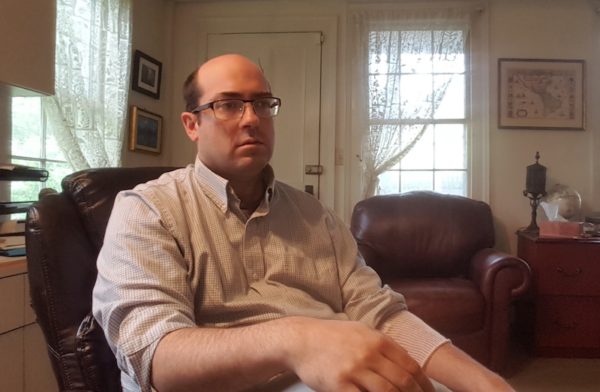
David’s story
When he was in his early 20s, David Aronson, who’s 37 now, got a tick bite. He was living in the woods at the time and says he wouldn’t be surprised if he’d been bitten before.
“I really didn’t pay attention back then,” he told me. “I had a dog that was always in my bed. The tick wasn’t on me for very long but what I did which almost certainly caused a problem was I removed it wrong. Proper removal is really important because if you don’t, they regurgitate stomach contents back into you, which increases your chance of infection.”
A few weeks after he removed the tick, David got a nasty bout of what he thought was the flu. “I got a little better,” he said, “but I saw the doctor because I had this weird kind of nerve pain. She wanted me to get a Lyme test, which I did. It was negative. She said to come back in a couple weeks because they’re often wrong. I felt better so I didn’t.”
For the next years or so he had strange back pain that would come and go. He developed insomnia and obsessive-compulsive behavior. He still functioned well enough — until the summer of 2013 when he and his wife moved into a house that needed a lot of work and created a lot of stress.
“I began to go numb in both feet at the same time and my toes. I wasn’t sleeping again and I began to have a lot of pain. Over the next six months, a different doctor ran different tests for everything. I went to a neurologist and he couldn’t find anything wrong. I had MRIs done and nothing was wrong, a syphilis test which was surprise, surprise negative. He did ask me if I had a tick bite and I said not in many years and so that was the end of that conversation.”
Things got so bad David went to yet another doctor. “I told my wife if he couldn’t see me the next day I was just going to the emergency room after work and sit there until somebody could tell me what’s wrong,” he said. “I was in so much pain. I was also doing things like getting off the wrong exit on the way home, having moments driving back and forth, not knowing if I was going to work or coming home from work. It would take me a minute and I’d have to look at the clock to get the time of day and all of a sudden everything would kind of reset. I had a lot of brain zaps — sort of like for a brief second everything kind of just goes blank, like a hard reset on the computer. It was weird.”
He got an appointment for the next day and this time, Lyme Disease was the first thing the doctor suspected. He sent a blood sample to a Lyme Disease lab in California and it came back strongly positive for Lyme Disease. David started antibiotic treatment right away, but because he’d had the infection for so long, although he felt better, many of his symptoms lingered.
“I was on antibiotics for a year before I took a break,” he said. “I was really feeling much better and things stayed stable for a few months but then I got new numbness in my feet. I lost my job because I was having such memory problems, I took the wrong day off.”

He went back on the antibiotics. Since that time — September 2016 — David has been getting some of them intravenously. For four and one-half hours a day, seven days a week he hooks himself up to an IV at home. He didn’t want to share a picture of himself having the treatment, but this is him getting set up for one. He says he’s currently on five antibiotics and an anti-fungal medicine to help with side effects.
“I have to start at 4 or 5 pm, so I’m not up really late,” he said. “I’ve accepted that I’m probably not ever going to get back to where I was. As far as I know, in the best of circumstances, we can’t really kill this disease once it’s been around this long. I’m not getting worse and that’s first and foremost and then everything else is a bonus. I like to keep a happy perspective and just try and to make a living so that I can keep things going.”
Helping other people with Lyme Disease
David makes his living as a social worker with a counseling practice. He recently decided to add working with people struggling with Lyme Disease to his scope of practice. As he says, he provides a Lyme literate practice.
“I realized that the Lyme community was really underserved in that way,” he explained. “What I figured out is once the diagnosis is made and treatment is established, mental health is probably the most important thing in this process. It’s the thing that’s going to keep you going and help you not get too discouraged and be able to advocate for yourself and help you not drive your family insane. That’s something that’s not talked about a lot — how difficult it is on families and how disruptive it is to everybody’s lives.
One piece of advice for people who are struggling is to keep going. “One of my clients said to me ‘Accept everything and expect nothing.’ It’s a weird thing to say, but you have to persevere. Just do it with a level head and a great deal of acceptance.”
And his advice for all of us, whether we have a tick borne illness or not is: “Just check all the time, every day, for ticks. Prevention is the best medicine. You don’t want to be paranoid, but you have to make it part of your routine and take extra precautions when you go out.”
As David explained at the beginning of his story, when he found the tick all those years ago, he didn’t remove it properly. Jim Dill, pest management specialist at the University of Maine, demonstrates the right way in this video.

Thanks Diane for this story!!!!My husband has been suffering for years, and no one seems to understand . We are convinced that it is Lyme….and will find the right doctors!!!
I’m so sorry that you and he are going through this! Look for an email from me.
Did you get a specialist yet? I have it too. I am also suffering.
Thank you for sharing this story, Diane. Our 16-year-old daughter has lyme disease. She went undiagnosed for 2 1/2 + years. This has been the most heartbreaking experience for our family, and especially for our daughter. Along with the severe at times physical pains, she has suffered from severe negative impacts to her comprehension and to her cognitive abilities. This is so scary. Finding lyme literate Doctors is not easy. Knowing that there is a lyme literate social worker in Maine is really good news.
Deborah, if you’re still searching for a doctor, a great resource in Maine is MidCoast Lyme Disease Support and Education. Here’s a link to more information: http://www.mldse.org/p/blog-page_29.html.
I have not been able to work for 5 months. Very sick, misdiagnosed, Finally I insisted on a test..Dr refuses said I didn’t have bullseye. Not everyone does. Still sick weeks later. Insisted, you guessed it positive. Then I couldn’t find a fnp, or doctor that would give me more than 3 weeks of antibiotics even though I was still very sick and in tremendous joint pain..I am experiencing disabling symptoms but no one around here treats correctly. I found 2 providers in maine but they don’t take insurance.
Ann,
Midcoast Lyme Disease Support & Education might be a great resource for you. For one thing, they have a list of “Lyme literate” providers in Maine. You’ll find a referral page on their website. Here’s the link: http://www.mldse.org/p/blog-page_29.html.
I am thankful that you have found a way to use what happened to you to help others.
My story is somewhat similar and I am a licensed professional counselor. I contracted Lyme disease in 2012 and 6 years later am finally beginning to go back to work. I have a passion for mental health and am now going to focus on wellness as well. I want to take what I have been through and blend it with my profession to help others on their road to healing. I am glad to see you have done the same. I haven’t started my own practice yet, but my part time contractor job is ending so it is next on my list of things I want to accomplish. I went from a diagnosis that nearly killed me to living large with Lyme. It never took my spirit and I am determined to help others accomplish their goals. I think those of us who have had Lyme or cared for someone with Lyme have a unique perspective on helping others. I hope your practice continues to thrive and I can’t wait to see where mine will be a year from now!
David, have had lyme 27 years..1992 to present. On IM ceftriaxone and oral antibiotics and antifungals. Need acceptance.
Need help.
Thanks for your article. It is very good.
Are you by and slim chance aware of any lyme literate psychiatrists or psychologists in the Hamilton, Ontario, Canada area. Our family is desperate to find someone who will listen to my 57 year old son who has been afflicted with Lyme since 2014.